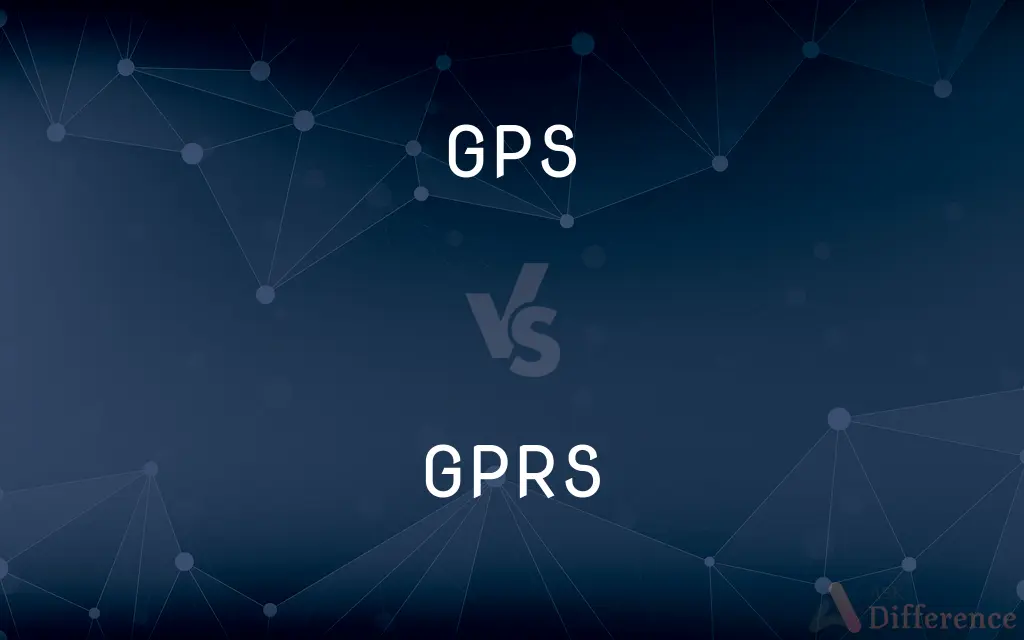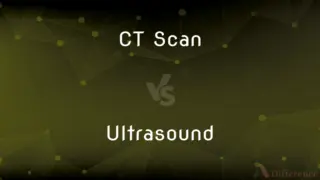GPS vs. GPRS — What's the Difference?
By Tayyaba Rehman — Published on January 8, 2024
GPS (Global Positioning System) provides location and time information globally, using satellites. GPRS (General Packet Radio Service) is a mobile data standard for transmitting data over cellular networks.

Difference Between GPS and GPRS
Table of Contents
ADVERTISEMENT
Key Differences
GPS, or Global Positioning System, is a satellite-based navigation system that provides geolocation and time information anywhere on or near the Earth. It operates independently of any telephonic or internet reception. GPRS, or General Packet Radio Service, is a packet-oriented mobile data standard on 2G and 3G cellular communication networks. It enables data services like internet browsing, emails, and multimedia messages.
GPS technology is used in navigation systems, such as in vehicles and smartphones, for mapping and tracking purposes. It relies on a network of satellites that transmit signals to GPS receivers. GPRS, on the other hand, is used for mobile internet and MMS services. It uses existing cellular network infrastructure to provide moderate-speed data transfer.
In GPS, the accuracy of location data can be very high, making it ideal for critical applications like military operations, aviation, and emergency services. GPRS provides data rates from 56 up to 114 kbps and continuous connection to the internet for mobile phone and computer users.
GPS is crucial for applications requiring precise geolocation, such as geotagging, surveying, and logistics. It’s free to use with a receiver and does not require any subscription fee. GPRS, in contrast, typically incurs data charges and depends on the user's mobile service provider.
GPS receivers calculate their position by timing the signals sent by GPS satellites. This system is essential for modern transportation and communication technologies. GPRS is a step towards 3G and 4G networks, allowing for more efficient use of network resources and improved data services for mobile users.
ADVERTISEMENT
Comparison Chart
Primary Function
Satellite-based location tracking
Packet-based mobile data communication
Dependency
Relies on satellites
Depends on cellular network infrastructure
Usage
Navigation, mapping, tracking
Internet browsing, emails, MMS
Data Transfer Speed
Not applicable (not for data transfer)
56 to 114 kbps
Cost
Free (requires receiver)
Varies (data charges by service providers)
Compare with Definitions
GPS
A satellite-based navigation system.
I used GPS to navigate to the remote campsite.
GPRS
Offers moderate-speed data transfer.
GPRS provides decent speed for browsing on my mobile.
GPS
Provides precise location and time information.
The archaeologists relied on GPS for accurate site coordinates.
GPRS
Operates on 2G and 3G cellular networks.
My old 2G phone uses GPRS for internet connectivity.
GPS
Essential in modern transportation and communication.
Air traffic control uses GPS for managing flight paths.
GPRS
A bridge between 2G and more advanced networks.
GPRS was a significant step towards 3G and 4G technologies.
GPS
Operates globally and independent of internet connection.
During the hike in the mountains, my GPS was the only reliable tool.
GPRS
Supports internet, MMS, and other data services.
Sending multimedia messages is easy with GPRS.
GPS
Used in various devices for mapping and tracking.
The delivery truck was equipped with GPS for real-time tracking.
GPRS
A mobile data transmission technology.
I accessed my emails via GPRS while traveling.
GPS
A navigational system involving satellites and computers that can determine the latitude and longitude of a receiver on Earth by computing the time difference for signals from different satellites to reach the receiver
Common Curiosities
What does GPRS stand for in mobile communication?
GPRS stands for General Packet Radio Service.
What are the data speeds of GPRS?
GPRS offers data speeds ranging from 56 to 114 kbps.
Is GPS available worldwide?
Yes, GPS coverage is global.
What is GPS mainly used for?
GPS is primarily used for geolocation, navigation, and time synchronization.
Can GPS work without an internet connection?
Yes, GPS can function without an internet connection as it relies on satellite signals.
What is the primary difference between GPS and GPRS?
The primary difference is that GPS is for location tracking, while GPRS is for mobile data communication.
Can GPRS be used for voice calls?
GPRS is primarily for data transmission, not voice calls.
Is GPRS still used today?
Yes, GPRS is still in use, particularly in areas with older network infrastructures.
How accurate is GPS?
GPS accuracy can be within a few meters under open sky conditions.
Do I need to pay to use GPS?
No, GPS is free to use, though you need a device capable of receiving GPS signals.
How does GPRS work?
GPRS transmits data in packets over existing cellular networks.
Can GPS track movements in real-time?
Yes, GPS can track movements in real-time with suitable devices and software.
Are there any data limits with GPRS?
Data limits for GPRS depend on the user's mobile service plan.
Can GPS be used indoors?
GPS signal strength is weaker indoors, making it less effective.
Does GPRS require a specific type of phone?
GPRS requires a mobile phone that supports 2G or 3G networks.
Share Your Discovery

Previous Comparison
CT Scan vs. Ultrasound
Next Comparison
Fordism vs. Post FordismAuthor Spotlight
Written by
Tayyaba RehmanTayyaba Rehman is a distinguished writer, currently serving as a primary contributor to askdifference.com. As a researcher in semantics and etymology, Tayyaba's passion for the complexity of languages and their distinctions has found a perfect home on the platform. Tayyaba delves into the intricacies of language, distinguishing between commonly confused words and phrases, thereby providing clarity for readers worldwide.













































